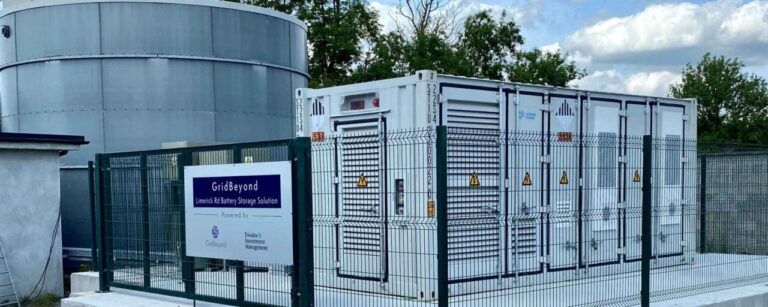Triodos Energy Transition Europe Fund has expanded its joint venture (JV) with battery energy storage system (BESS) company GridBeyond with a new multi-million investment.
Triodos has committed €11.25 million (£9.395 million) to the joint venture, called GridBeyond Storage, as part of a total investment of £10.44 million. Following this new funding injection, GridBeyond Storage is now preparing to finance two turnkey BESS projects in Ireland and Scotland, markets in which it has previously achieved success.
The two companies entered into their 50/50 joint venture in 2022, with the aim of developing behind-the-meter storage (BTM) projects for commercial and industrial customers in the UK and Ireland. Since its launch two years ago, the JV has completed two BESS projects, both for industrial customers in the glass manufacturing sector. The first of these projects, a 1MW/1.1MWh BESS for CareyGlass in the Republic of Ireland, went live in March 2023, while a second 8.MW/8.3MWh BESS for OI Glass in Scotland is currently under construction, with an expected commissioning date January 2025.
Michiel van Beek, head of project equity at Triodos Investment Management, says the company is pleased to expand the collaboration. He commented: “This next phase of our partnership is a promising development for our fund and our investors. By continuing to invest in BESS projects in the UK and Ireland, we are not only accelerating towards a net-zero future, but also positioning the fund to benefit from the growing demand for flexible energy solutions.”
GridBeyond deputy CEO Richard O’Loughlin agreed, adding: “It’s great to have the opportunity to deliver further flexible energy across the UK and Ireland to support the energy transition to a net-zero future.”
A vote of confidence for BESS investors
The news of an investment of this size, among other indications of good news, is a welcome update after months of concerns about the future of investment in the BESS sector.
Research consultancy Cornwall Insight has forecast an optimistic future for the sector, suggesting that BESS revenues will recover by the year 2026 after “a prolonged period of underperformance”. The company forecasts that annual revenues for 2-hour assets will increase from around £96/kW in 2025 to £108/kW in 2026, with other battery life systems experiencing similar levels of growth over this period.
The Irish BESS market in particular is predicted to see a huge leap in capacity. A separate study from Cornwall Insight predicts that battery storage capacity in Ireland’s short-to-medium term Internal Electricity Market (SEM) will increase fivefold by 2030.
This comes after one of the largest BESS investment funds, Harmony Energy Income Trust (HEIT), announced this had opened the second phase of the portfolio sale processwhich raises questions about the role of exchange-traded funds in the BESS market.
A source told our sister site Energy storage.News that HEIT’s choice to sell its entire BESS portfolio, in addition to the fund’s ongoing revenue struggles, raises fundamental questions about BESS’s suitability for exchange-traded funds like HEIT, noting that “the bigger question this whole thing raises is whether these funds are the best way to raise money on the market for BESS projects.”


